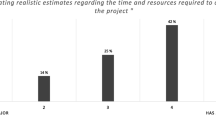Abstract
This paper argues that the concept of reliability provides a useful framework for analyzing defects in organizational design and for prescribing changes that will facilitate ethical decision making. Reliability becomes an ethical concern when the individual or organizational interest diverges from the collective interest. Redundancy and requisite variety provide two design tools which can enable organizations to act reliably in the collective interest. The paper then discusses potential disadvantages to the use of a reliability framework as well as possible problems of implementation. It concludes by examining avenues for future research.
Similar content being viewed by others
References
Antal, A. B.: 1985, ‘Institutionalizing Corporate Social Responsiveness: Lessons Learned from the Migros Experience’,Research in Corporate Social Performance and Policy 7, 229–249.
Armstrong, J. S.: 1977, ‘Social Irresponsibility in Management’,Journal of Business Research 5, 185–213.
Arrow, K. J.: 1974,The Limits of Organization (W. W. Norton & Company, New York).
Ashby, W. R.: 1968, ‘Variety, Constraint, and the Law of Requisite Variety’, in W. Buckley (ed.),Modern Systems Research for the Behavioral Scientist: A Sourcebook (Aldine, New York), pp. 129–36.
Brady, F. N.: 1990,Ethical Managing: Rules and Results (Macmillan, New York).
Epstein, E. M.: 1987, ‘The Corporate Social Policy Process: Beyond Business Ethics, Corporate Social Responsibility, and Corporate Social Responsiveness’,California Management Review 29, 99–114.
Ewing, D. W.: 1989,Justice on the Job: Resolving Grievances in the Nonunion Workplace (Harvard Business School Press, Boston).
Freeman, R. E.: 1984,Strategic Management: A Stakeholder Approach (Pitman, Boston).
Gerth, H. H. and C. W. Mills (eds.): 1946,From Max Weber: Essays in Sociology (Oxford University Press, New York).
Gilligan, C.: 1982,In a Different Voice (Harvard University Press, Cambridge, Mass.).
Hardin, R.: 1988,Morality within the Limits of Reason (Universitysity of Chicago Press, Chicago).
Hayek, F. A.: 1945, ‘The Uses of Knowledge in Society’,American Economic Review 35, 519–30.
Henderson, J. M. and R. E. Quandt: 1971,Microeconomic Theory: A Mathematical Approach (2nd. ed.) (McGraw-Hill, New York).
Hosmer, L. T.: 1987,The Ethics of Management (Irwin, Homewood, IL).
Jackall, R.: 1988,Moral Mazes: The World of Corporate Managers (Oxford University Press, New York).
Janis, I. L. and L. Mann: 1977,Decision Making: A Psychological Analysis of Conflict, Choice, and Commitment (The Free Press, New York).
Kececioglu, D.: 1991,Reliability Engineering Handbook, vol. 1 (Prentice-Hall, Inc., Englewood Cliffs, NJ).
Landau, M.: 1969, ‘Redundancy, Rationality, and the Problem of Duplication and Overlap’,Public Administration Review 29, 346–58.
Lerner, A. W.: 1986, ‘There is More than One Way to be Redundant: A Comparison of Alternatives for the Design and Use of Redundancy in Organizations’,Administration & Society 18, 334–59.
Lieberman, J. K.: 1981,The Litigious Society (Basic Books, New York).
Lorsch, J.: 1986, ‘Managing Culture: The Invisible Barrier to Strategic Change’,California Management Review 28, 95–109.
March, J. G. and H. A. Simon: 1958,Organizations (Wiley, New York).
Merton, R. K.: 1957,Social Theory and Social Structure (2nd ed.) (Free Press, Glencoe, IL).
Miles, R. H.: 1987,Managing the Corporate Social Environment: A Grounded Theory (Prentice-Hall, Inc., Englewood Cliffs, NJ).
Milgram, S.: 1974,Obedience to Authority (Harper & Row, New York).
Murphy, P. E.: 1988, ‘Implementing Business Ethics’,Journal of Business Ethics 7, 907–15.
Murphy, P. E.: 1989, ‘Creating Ethical Corporate Structures’,Sloan Management Review Winter, 81–87.
Niskanen, W.: 1975, ‘Bureaucrats and Politicians’,Journal of Law and Economics 18, 617–43.
Olson, M.: 1965,The Logic of Collective Action (Harvard University Press, Cambridge, MA).
Petersen, T.: 1989,Individual, Collective, and Systems Rationality in Work Groups: Dilemmas and Solutions. Unpublished paper. Haas Graduate School of Business Administration, University of California, Berkeley.
Rawls, J.: 1971,A Theory of Justice (Harvard University Press, Cambridge, MA).
Roberts, K. H.: 1990, ‘Some Characteristics of One Type of High Reliability Organization’,Organization Science 1, 160–76.
Schwenk, C. R.: 1984, ‘Devil's Advocacy in Managerial Decision-Making’,Journal of Management Studies 21, 153–68.
Scott, W. R.: 1987,Organizations: Rational Natural, and Open Systems (2nd ed.) (Prentice-Hall, Inc., Englewood Cliffs, NJ).
Scott, W. G. and D. K. Hart: 1979,Organizational America (Houghton Mifflin Company, Boston).
Selznick, P.: 1949,TVA and the Grass Roots (University of California Press, Berkeley, CA).
Simon, H. A.: 1957,Administrative Behavior (2nd ed.) (Macmillan, New York).
Stone, C. D.: 1975,Where the Law Ends: The Social Control of Control of Corporate Behavior (Harper & Row, New York).
Strauss, G.: 1982, ‘Workers Participation in Management’,Research in Organizational Behavior 4, 173–215.
Tarr, C. W.: 1988,Bhopal. Cornell University Johnson Graduate School of Management Case.
Vaughan, D.: 1990, ‘Autonomy, Interdependence, and Social Control: NASA and the Space Shuttle Challenger’,Administrative Science Quarterly 35, 225–257.
Victor, B. and J. B. Cullen: 1988, ‘The Organizational Bases of Ethical Work Climates’,Administrative Science Quarterly 33, 101–25.
Weick, K. E.: 1976, ‘Educational Organizations as Loosely Coupled Systems’,Administrative Science Quarterly 21, 1–19.
Weick, K. E.: 1987, ‘Organizational Culture as a Source of High Reliability’,California Management Review 29, 112–27.
Wildavsky, A.: 1972, ‘The Self-Evaluating Organization’,Public Administration Review 32, 509–20.
Williamson, O. E.: 1985,The Economic Institutions of Capitalism (The Free Press, New York).
Author information
Authors and Affiliations
Additional information
Bryan W. Husted is an assistant professor in the Management Department of the Instituto Tecnologico y de Estudios Superiores de Monterrey in Mexico.
Rights and permissions
About this article
Cite this article
Husted, B.W. Reliability and the design of ethical organizations: A rational systems approach. J Bus Ethics 12, 761–769 (1993). https://doi.org/10.1007/BF00881308
Issue Date:
DOI: https://doi.org/10.1007/BF00881308




